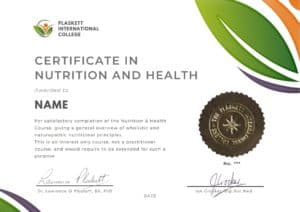
A Message from the Author
This course is a must for anyone who is passionate about health & well-being whether in relation to themselves and their loved ones, or in the workplace whereby an understanding of nutrition will enhance the service you provide . It will teach you basic nutritional principles and help you to formulate healthy diets and set out well-informed programmes for yourself and for your family when faced with the bewildering array of nutritional supplements on the shelves today. The hope is expressed that this course will lead you to feeling more informed, on a deeper naturopathic level, and provide you with a range of measures that you can apply towards better health.

Dr. Lawrence Plaskett
Course Overview
The Plaskett certificate in Nutrition & Health is designed for individuals who are passionate about health & wellbeing, whether on an informal basis whereby it will enable you to work out sound nutritional regimes for yourself or for members of your family, or on a professional basis whereby nutrition is a feature of your line of work and a better understanding of the subject will only enhance the service that you provide.
In studying this course, you will:
- Be introduced to the concept of naturopathy
- Gain a general understanding of the subject of health and nutrition
- Grasp the fundamentals of the cell's need for nutrients
- Appreciate the role of carbohydrates, fats, proteins, vitamins and minerals and understand the basics of how these nutrients work in the body
- Be aware of the enormous health benefits that can come from favourable dietary change
- Appreciate the merits of particular foods and nutrients
- Ultimately gain the knowledge that will lead towards a better standard of well-being now, and a prolonging of good health in the future

Although this is not a practitioner level course, it will benefit any health care professional who wants to expand her/his knowledge of nutrition and health. Whether you work in mainstream medicine or in one of the alternative disciplines, the course can inform aspects of your main practice or enable you to provide simple nutritional programmes for your clients. It is especially useful if you are working in:
- voluntary health care or employment in health and fitness, weight control, catering, the health food market or the nutrition business, or even in the media reporting upon nutritional subjects.
- the NHS in contact with patients.
- alternative and complementary medicine such as an osteopath, chiropractor, acupuncturist, homoeopath, herbalist, reflexologist, aromatherapist etc and wanting a better general understanding of nutrition to supplement your professional base.
- contemplating moving into alternative and complementary medicine in the future.
Breakdown of the Course Sections
The Nutrition & Health Certificate includes the following 12 sections:
Testimonials
Here's what students have to say about the course



Pricing
Nutrition & Health Course
£125
- Lifetime Access to Course Material
- Full Tutor Support
- Certificate in Nutrition & Health upon Completion
- Option to Advance onto Full Diploma
F.A.Q.
No, there is no requirement to complete this course prior to studying our Nutritional Therapy course.
All our courses are accredited by the IICT (International Institute for Complementary Therapists).
If you would like a hard copy of the course material to complement your online studies, you can purchase this for £10 (p&p incl.)
There is a series of multi-choice questions to complete throughout the course with a short 200 word essay to complete at the end of the course.
You will receive a certificate of completion and the option to transition onto another course.
Although this course serves as an excellent introduction to nutritional therapy, it is not designed for the full training of Nutritional Therapists. These people are trained to treat the sick through nutritional means and require much fuller professional training with a wealth of medical knowledge. However, this course could be a first step towards that goal, since it can give you exposure to the field and help you to decide whether or not nutritional therapy could become either your future profession or a very useful extension of what you already do.
Upon completion of this course, you can transition easily onto the Diploma in Nutritional Consultancy and be exempt from part 1, or you can advance onto the Nutritional Therapy course.


